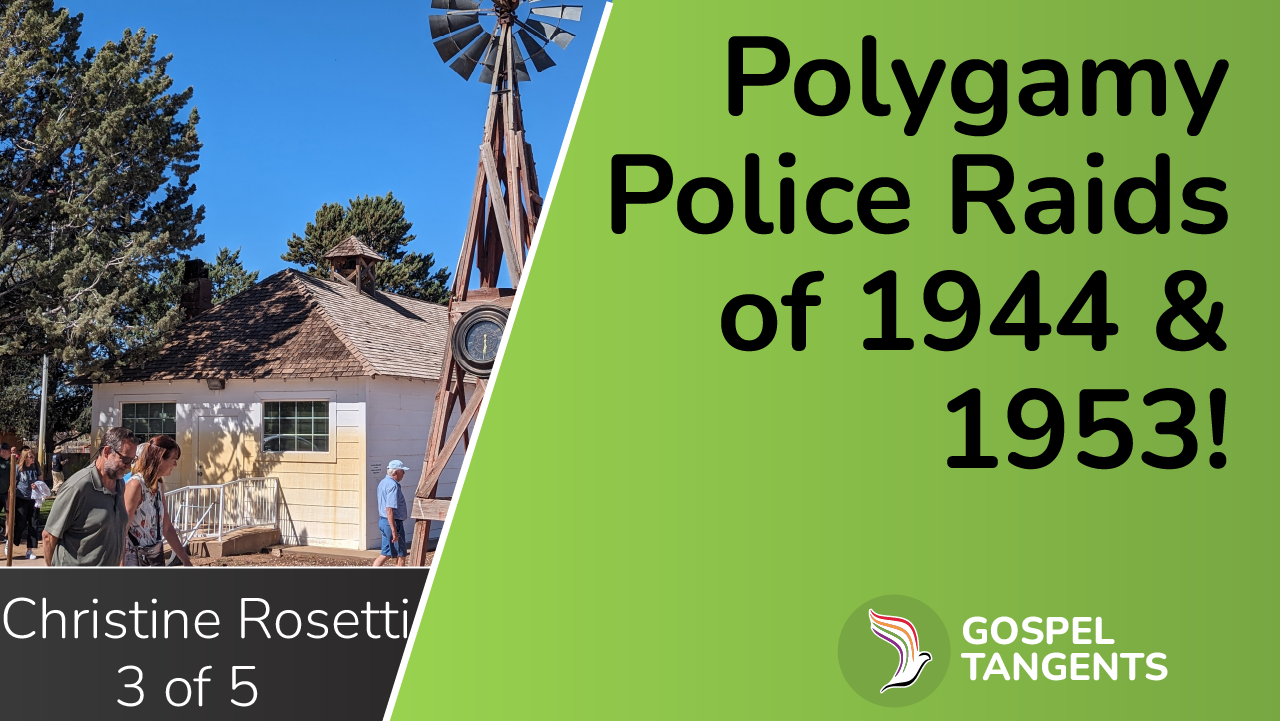1944 & 1953 Police Raids on Polygamists (Cristina Rosetti 3 of 5)
- Author
- RickB
- Published
- Mon 13 May 2024
- Episode Link
- https://gospeltangents.com/2024/05/police-raids-on-polygamists-3-5/
1944 & 1953 saw Police Raids on polygamists. These were traumatic reminders that they couldn't trust authorities. Dr Cristina Rosetti details more on these police raids and why fundamentalist Mormon communities became wary of outsiders. We'll talk with Dr Cristina Rosetti about the schisms that happened following these raids. Check out our conversation...
https://youtu.be/OoTaWOQja2I
Don’t miss our other conversations with Cristina: https://gospeltangents.com/people/cristina-rosetti/
Copyright © 2024
Gospel Tangents
All Rights Reserved
Except for book reviews, no content may be reproduced without written permission
1944 & 1953 Raids
Cristina 00:34 Yeah, so he goes. In 1944, there was a raid in the community. Many prominent people go to prison in the raid. In both 1944 and 1953, both men and women go to prison. That's something a lot of people forget about. Women go to prison to for polygamy.
GT 00:55 But, they're more going after the men than the women. Aren't they?
Cristina 00:59 They are. But women go to prison for polygamy. Women are fined. There are some great pictures of very cute, dressed up, fashionable, stylish women sitting in their prison cell, looking very proud of themselves for it. I think that is something that is so important. In this period, to go to prison for polygamy is to be persecuted for your religion. You're Joseph Smith. Even in some way to be excommunicated for polygamy, too, at this time, for some of these people, it's a badge of honor. You were willing to lose everything. You were willing to even put your blessings on the line for the cause of God. I mean, you're making a lot of martyrs out of this. So, in 1944, he goes to prison. A lot of the leadership go to prison. One of the things that happens in the prison that will eventually create early fissures in the fundamentalist movement, is all of the men know that they can get out if they just sign a loyalty oath. Half of them decide to do it. Musser is one of them. Musser signs the loyalty oath, of course...
GT 02:22 With no intention of being loyal.
Cristina 02:24 No. He's never going to. He's going to keep getting married. He's certainly going to keep telling people to get married. He has no intention of ever aligning himself with the Church, or with the state. But he signs the oath, because this is a man who's a polygamist. He has a lot of wives, a lot of children. How are you going to support people, if you're sitting in a cell? He also is running. They're all running a fundamentalist religion. They need to get out of prison. And so Musser signs it. He knows he's never going to live it. But some men, they were like, "No. We're not going to be a Wilford Woodruff of another age. We're sitting in prison for the cause of God." This causes a lot of tension that it becomes, these men who were willing to cave even though they still were polygamous, and the men who decided to stay. You can sense that if you get out of prison later than your friends and you come strolling back into town, there's going to be a little bit of resentment that they all got out. So, this will create fissures. Even today, a lot of people who grew up FLDS, or grew up Centennial will kind of make comment of, like, "Musser, who signed the oath." There's a little bit of hostility because their men, the people who become FLDS and Centennial Park did not sign the oath.
GT 03:46 Okay, because I thought Bryan told me a lot of those people were independent fundamentalists and not FLDS.
Cristina 03:55 Yeah, so the notable people who didn't were Charles Zitting and Louis Kelch. Those are the two big guns that didn't sign the oath.
